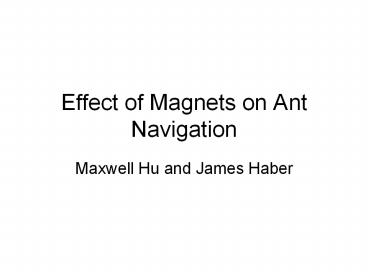Effect of Magnets on Ant Navigation - PowerPoint PPT Presentation
1 / 11
Title:
Effect of Magnets on Ant Navigation
Description:
Effect of Magnets on Ant Navigation Maxwell Hu and James Haber Abstract These test will provide more accurate drug targeting in humans and nanotechnologists might ... – PowerPoint PPT presentation
Number of Views:93
Avg rating:3.0/5.0
Title: Effect of Magnets on Ant Navigation
1
Effect of Magnets on Ant Navigation
- Maxwell Hu and James Haber
2
Abstract
- These test will provide more accurate drug
targeting in humans and nanotechnologists might
find ways to make it serve as a tiny data storage
device. The purpose of this experiment is to test
whether magnetic fields have an effect on ant
navigation. To conduct this experiment, we placed
a bottomless nine and a half springform pan on
the bottom of a large plastic box. The springform
pan was placed on top of the opening of a plastic
bag and the sides of the box were covered with
black construction paper to block any point of
navigation. The control, without the magnets, had
a piece of muffin on one side of the ring and the
ant placed in the center. We timed how long it
took the ant to reach the food, with five minutes
being the maximum amount of time it takes to
reach the food. Once an ant reaches the food, the
next ant is placed in the center and the process
is repeated. The variable tests had a ring or
square of magnets submerged under the sand, with
the center point in the middle of the pan. The
same process as the control ants was repeated.
3
Need
Thousands of people die of cancer each year, but
bioengineering with magnetic crystals, could help
navigate nanobots or bacteria through the human
body http//vaperforms.virginia.gov/images/graphs/
HealthFamily/Cancer-DeathRatebyState.png
Pest destroy millions of crops each year, but
they could be controlled by magnetic fields and
pheromones http//www.bats.ch/bats/publikationen/1
995-1_TA/pics/1.8_production_losses.gif
4
Knowledge Base
Figure 1 Magnets in testing arena
Figure 2 the magnetic field and pheromone
detectors are in the ants antennae and pheromones
are released from the hindgut, pygidium, rectum,
sternum and hind tibia
5
Literature Review Part 1
- Ant antennae carry internal GPS
- Jennifer Viegas
- May 21, 2009
- Magnetic minerals found in ant antennae
- Using high-powered microscopes and chemical
analysis, discovered dirt-acquired magnetic
particles in antennae. - Ants receive geomagnetic information, transduce
it in signal to nervous system, then brain. - http//www.abc.net.au/science/articles/2009/05/21/
2577321.htm
Magnetic crystals found in ant antennae
6
Literature Review Part 2
- First identification of a trail pheromone of an
army ant - N. J. Oldham, E. D. Morgan, B. Gobin and
J. Billen - February 24, 1994
- Blind army ants are able to navigate solely on
chemical pheromone scents. - Release trail pheromone from postpygidial gland
- http//www.springerlink.com/content/h24h13h4275614
m2/
7
Purpose
- The Effect of Magnetic Fields on Ant Pheromone
Trails - Alternate Hypothesis The time it takes to reach
the food will increase when there is a magnetic
field. - Alternate Hypothesis In a control test, the time
it takes to reach the food will decrease after
the first ant finds the food.
8
Methodology
9
Discussion
- Magnets affect ants ability to follow and
navigate pheromone trails - Other studies have shown that ants navigate with
pheromones and that they contain natural magnetic
crystals, but our study shows that these systems
conflict - This is probably because pheromone navigation
evolutionarily predate the magnetic navigation,
and the former can override the latter
10
Future Studies
- This experiment could be conducted better with a
larger testing area, and stronger magnets - Some new studies based on this experiment could
be testing different ant species, different types
of food, positions of magnets, or artificial
pheromones
11
Bibliography
- http//www.anthillwood.co.uk/anatomy2.png
- http//en.wikipedia.org/wiki/AntNavigation































